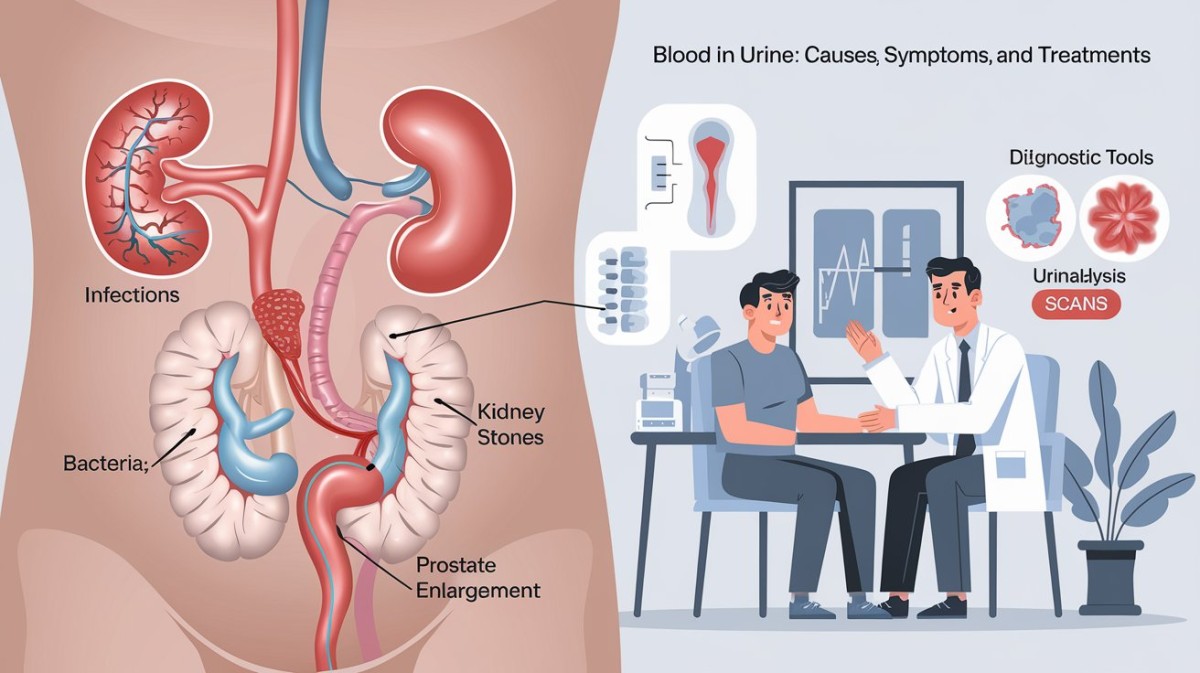Have you ever been startled by a sudden change in your urine's color?
Imagine going to the restroom, expecting the usual clear or yellowish hue, only to find a tinge of pink or even red. You might brush it off, thinking it could be something you ate, but deep down, you wonder: could it be blood?
The presence of blood when one goes for restroom becomes a worrying sign which is referred to as hematuria. It is one of the tasks that make you focus on them right away, and I believe this is a correct line of action. However, be it the tinge of red or something darker, anywhere between it, hematuria is a signal that something in your body is not quite right. But what could cause it, and when should you worry, that’s what we will be focusing on in this article.
What is Hematuria?
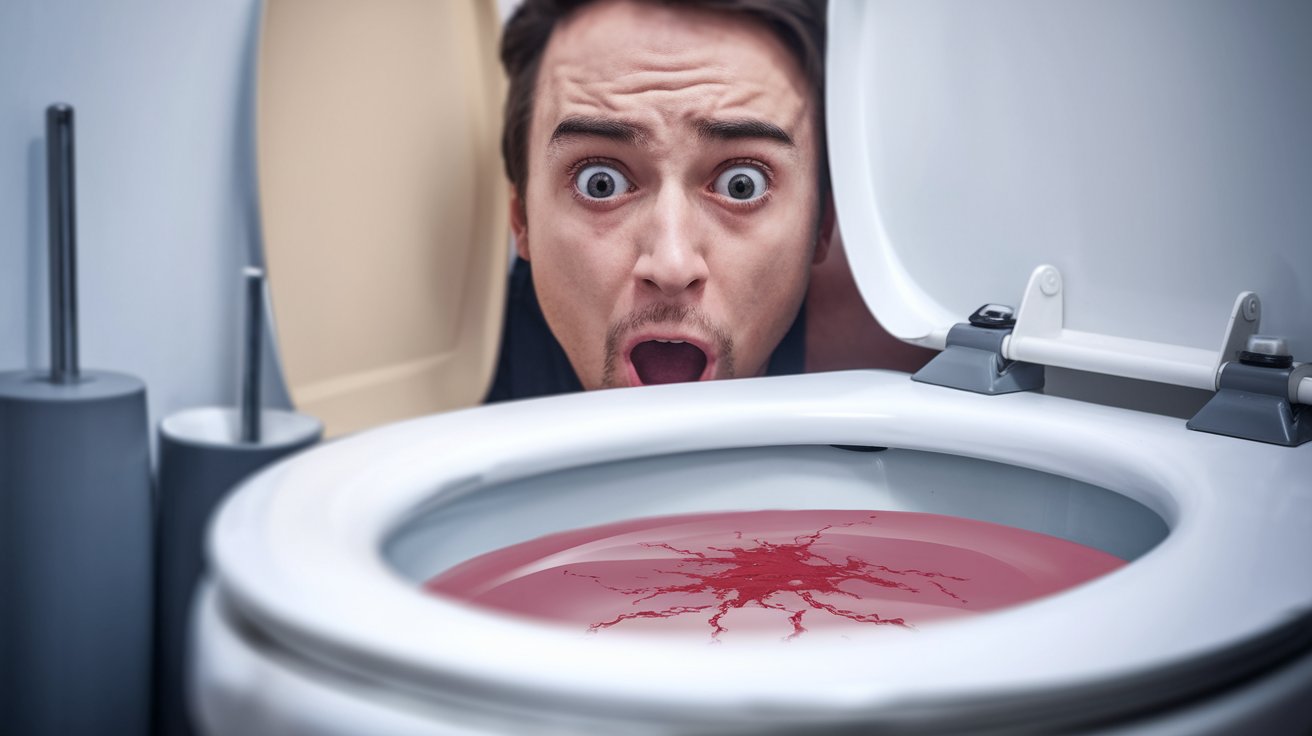
Hematuria means that you have traces of red blood cells in your urine. There are two types:
Microscopic hematuria:
Where the blood is not easily seen by naked eye such as drops of blood but the blood can easily be seen in a microscope or a laboratory test.
Gross hematuria:
Where the blood is visible hence giving the urine a pink or red like color.
Actually, like with haematuria, having blood in your urine doesn’t necessarily mean experiencing pain thus make it even more complex. However, though some are harmless, most are signs of another condition that requires attention from a doctor.
Common Causes of Blood in Urine
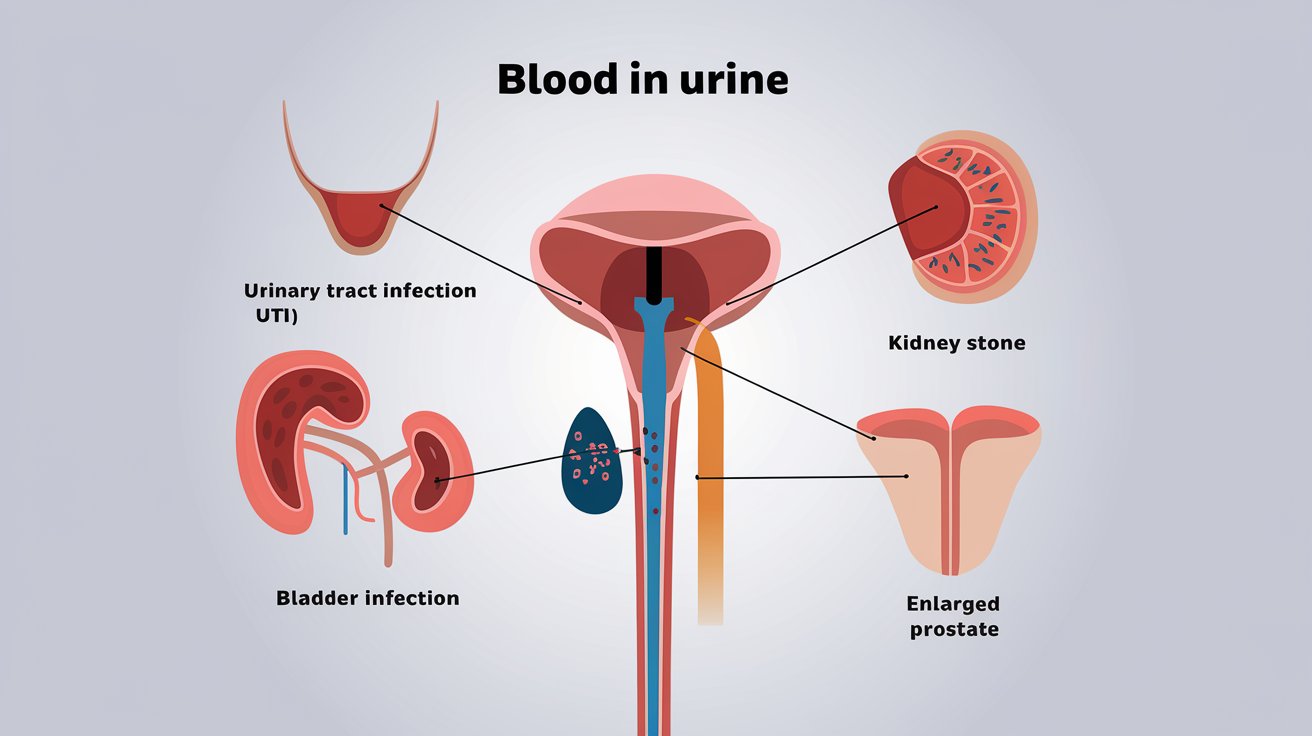
Hematuria can be due to a number of causes which may be of various complications, minor or serious. Here are some common causes:
Urinary Tract Infections (UTIs)
Blood in the urine is seen in UTIs, which are one of the most recurrent causes of the problem. That is when bacteria invasion occur within the urinary system; they form urines that causes irritation in the bladder, thus, development of hematuria. Others signs may be the following: the need to urinate often, feeling pain when passing urine or passing urine that is dark or has an unpleasant smell.
Kidney Stones
These utilize minerals in the urine creating formation of stones in the kidney which can pass through the urinary track to cause bleeding. If you have ever suffered from kidney stones, you will agree with me that it is one of the most painful experiences one can ever imagine, the pain is sharp and stabbing.
Bladder or Kidney Infections
Like with UTI’s, bladder or kidney infections are also known to bring about hematuria. Specifically, one of the complications associated with kidney infections are; fever, chills, pain in the back, and blood in the urine.
Enlarged Prostate
Evidently in men, an enlarged prostate may result to formation of blood in urine. The prostate increases in size and compresses the urethra hence making it difficult for urine to flow freely and may contain some blood.
Vigorous Exercise
However, hematuria has been reported occasionally during vigorous workouts or exercises particularly in the endurance athletes. They are not sure about the cause though it may have resulted due to a blow on the bladder or non availability of water for some time.
Kidney Disease
Also referred to as hematuria, the medical conditions that cause kidney problems like glomerulonephritis can cause this condition. In this condition, the tiny filtering units of the kidney become inflamed, which sometimes results to rupture and hence blood can be seen in urine.
Cancer
While not very frequent, hematouria can be an indication of bladder, kidney or prostate cancer. In the case that hematuria is chronic and the cause cannot be determined, then it is highly advised to exclude significant disease.
Symptoms Accompanying Hematuria
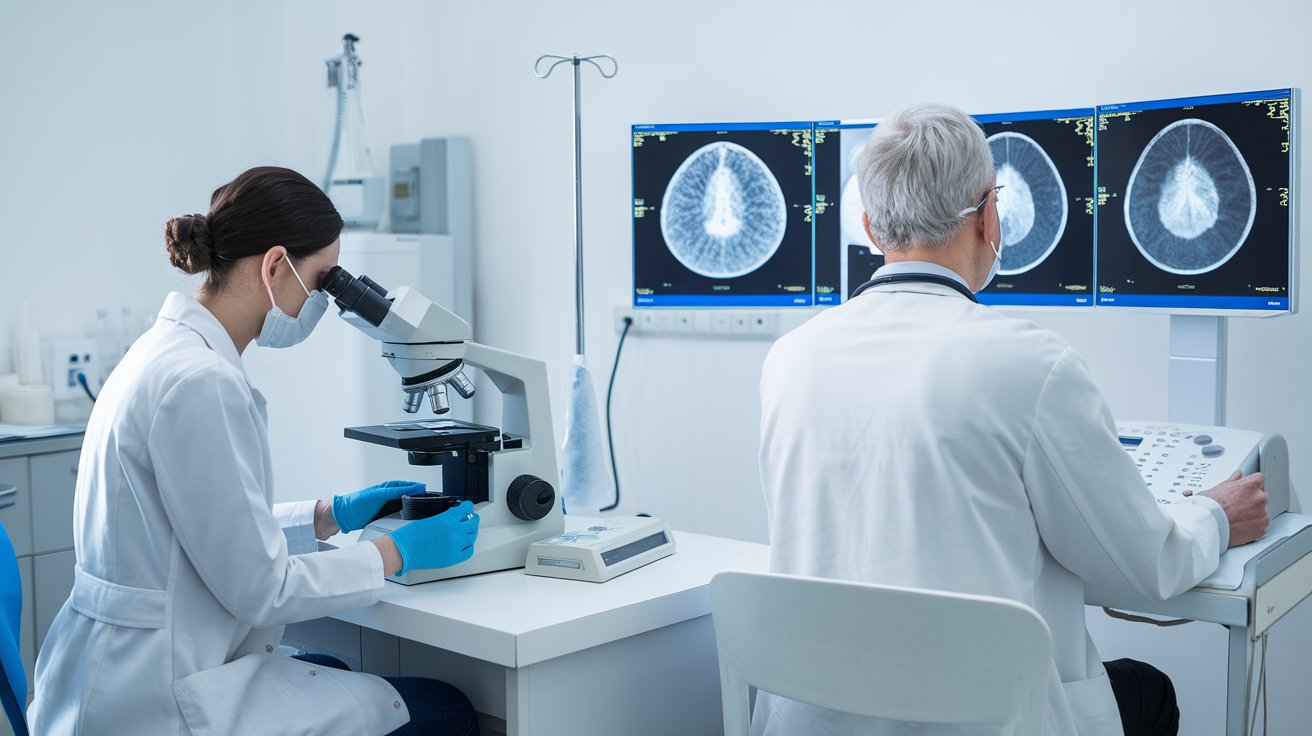
Aside from visible blood in your urine, there are several other symptoms that may accompany hematuria, depending on the underlying cause:
❖ Discomforts such as burning sensations during passing of urine
❖ Frequent urination
❖ An inconvenient flow, slow, dribbling or weak urine stream
❖ Right-side pain or mid-line discomfort
❖ Fever or chills – particularly in the case of infection or flu.
❖ This includes urine colored in an abnormal way or having an unfavourable smell.
One should, however, understand that, at times, hematuria may develop discreetly and there is no feeling of pain or presence of other symptoms which is why any observation of blood in urine should be considered serious.
Diagnosing Hematuria
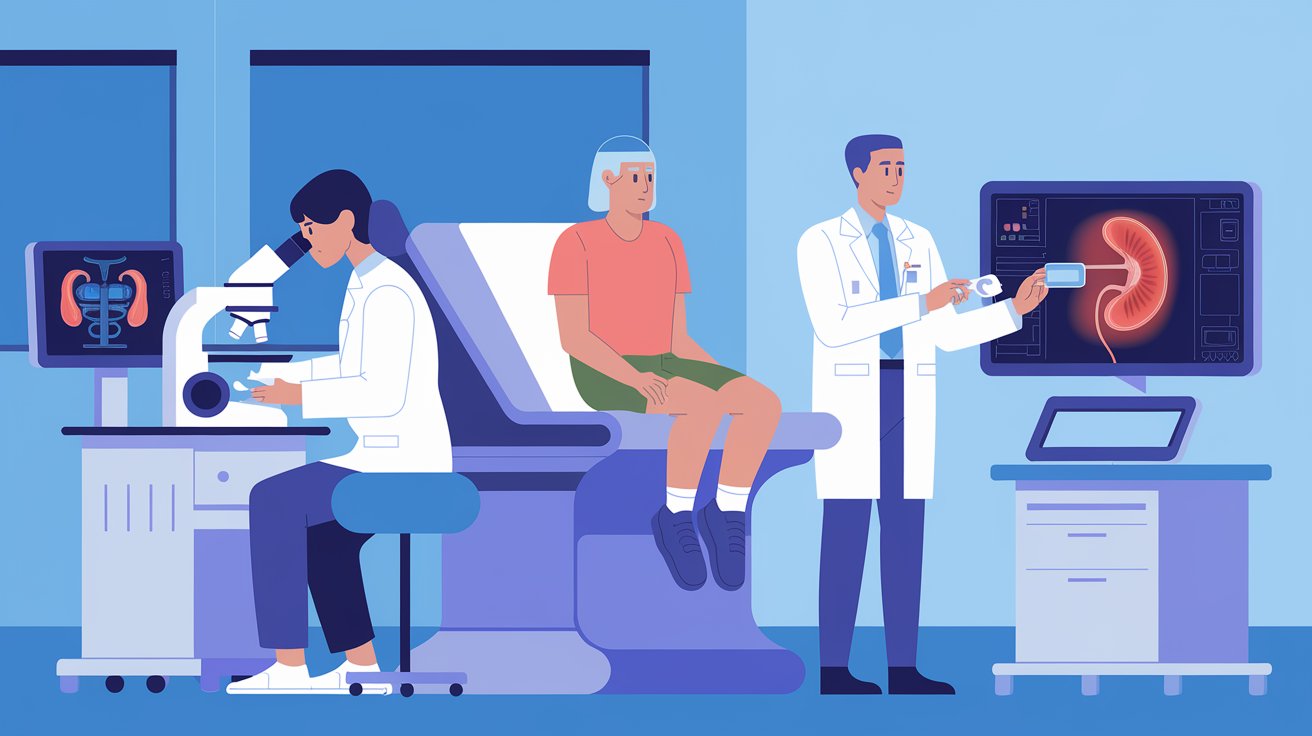
But in case you are facing this problem, and you discover blood in your urine, then your doctor will have to run several tests to diagnose what could have caused it. These may include:
❖ Urinalysis: A urine test to see whether blood, bacteria and other such abnormalities are present in it or not.
❖ Imaging tests: An ultrasound or ct scan or MRI may be done to look for the stones, tumours or any other abnormalities in the kidneys, bladder and urinary tracts.
❖ Cystoscopy: A small camera called cystoscope is used to examine interior of the bladder for tumour formation, presence of stones or other eventualities on the lining of the bladder.
It will also enable your doctor to identify the cause of the condition as well as the right treatment depending on your medical history and physical examination.
Treatment Options for Hematuria

How to deal with blood in the urine depends on why it is there in the first place. Here’s a look at how some of the underlying issues are typically addressed:
UTIs
UTIs are typically treated with antibiotics in order to clear the infection and dissolve inflammation in order to stop the flowing of blood in your urine.
Kidney Stones
The tiny kidney stones do not need invasive treatment and CAN be treated with lots of water intake and pain killers. Larger ones can only be treated through medical means such as lithotripsy where sound waves are used to break the stone or could be extracted through surgery.
Prostate Treatment
If it’s caused by an enlarged prostate then drugs or surgeries that can reduce the size of the prostate may be recommended.
Cancer
If the cause of haematuria is a cancerous growth then treatment may comprise of removal of the growth through surgery, chemotherapy or radiation depending on the type of cancer and the stage it has reached.
Infections
Urinary and kidney infections require prescriptions of Antibiotics. At occasions, the patient may need to be admitted into the hospital if the infection is serious.
Lifestyle Changes
For those whose Hematuria is condition is a result of exercising, then it is advised that one should take precaution as pertains to the intensity of the exercise and ensure adequate fluid intake.
Prevention Tips

While not all causes of hematuria are preventable, there are steps you can take to reduce your risk:
❖ Make the effort needed to keep the urinary tract healthy by drinking as much water as you can during the day.
❖ Do not fall ill; ensure that you practice good hygiene.
❖ Take low-salt foods as well as low protein as these foods have implications of forming kidney stones.
❖ Among the precaution measures, abstaining from sexual activities, or practicing safe sex will help in avoiding acquiring infections that may have an impact on the urinary tract.
❖ Go for periodic examination to check for symptoms of such diseases as prostate enlargement or even early stage cancer.
When to Seek Medical Help
If you get an opportunity to see blood in your urine then it is advisable to see a doctor even if it is one time only. Although some cause may be harmless others may be dangerous and hence the need to have early diagnosis. Hematuria like other symptoms should not be looked down on especially when it is accompanied by features such as pain, fever or changes in the habits of passing urine.
I would recommend an annual health checkup for every person especially for those who are 40 years or above.
The checkup should include:
❖ Routine blood tests CBC Liver function
❖ Kidney function
❖ Thyroid function
❖ Lipid profile
❖ Urine test
❖ HbA1C
Certain cancer screening blood tests like CA19.9, CEA, PSA (men) CA125(Women)
Along with that:
❖ Ultrasound Abdomen and Pelvis
❖ Chest xray
❖ ECG
❖ 2D Echo
❖ TMT
In any multispeciality hospital, all of these tasks can be completed in half a day... And the going rate would be roughly Rs 6000.
Every five years, endoscopy and colonoscopy are performed to screen for colon, stomach, and esophageal cancer.
Women should get a mammogram every year; this test is typically covered under the comprehensive checkup package.
Owing to the sharp increase in cardiac illnesses, particularly in the younger population, I would also advise getting a CT coronary angiography once every five years to look for early heart blockages.
The most crucial elements of maintaining good health are eating a diet rich in vegetables and avoiding fried and sugary foods.
Constantly eat until 80% full. and not before you are able.
The American Heart Association suggests doing cardiac exercise five times a week, which includes two days of weight training, to raise your heart rate to 120 beats per minute.
